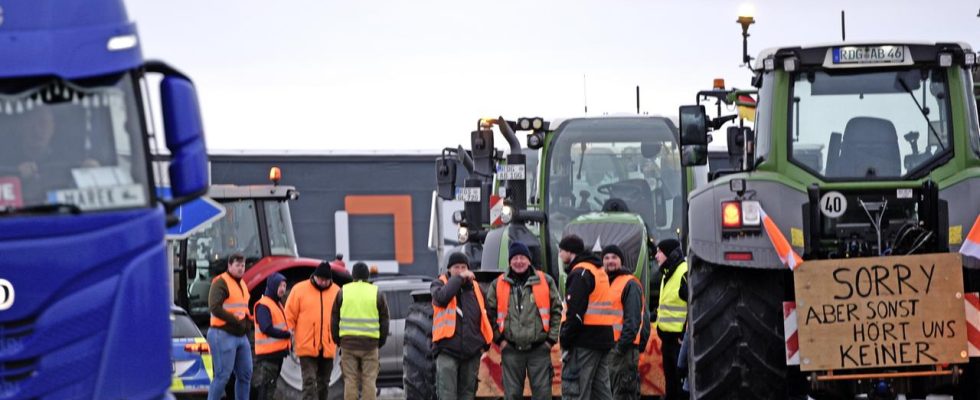analysis
The farmers remain persistent – and so does the traffic light government. Many keywords in the debate are familiar and the question arises as to why there have not long been solutions to old problems in agricultural policy.
Farmers want to take to the streets all week. Their anger is directed against cuts in agricultural subsidies, but not only. The fact that the federal government partially withdrew the plans before the start of the protest week did not take the wind out of the protest’s sails.
For days, traffic light representatives have been trying to counteract the impression that they have given in. Farmers had previously been burdened disproportionately, this was corrected last week, Federal Agriculture Minister Cem Özdemir (Alliance 90/The Greens) repeats again and again. The federal government rejects the calculation that further protests would soon correct the traffic lights even more and completely reduce the savings.
If you want new subsidies, you have to forego old ones, says Finance Minister Christian Lindner (FDP), defending the compromise. Chancellor Olaf Scholz (SPD) also stands by: “This is our proposal now.” The parliamentary groups in the Bundestag will next discuss this proposal. Theoretically, it would still be possible to incorporate changes there.
Does the Bundestag have to fix it?
There is pressure to make improvements not only from the Union side, but also from several SPD Prime Ministers, such as those from Lower Saxony and Mecklenburg-Western Pomerania. It would be a face-saving solution – not the government, but Parliament takes back the remaining savings.
But the traffic light is faced with a dilemma: critics who accuse it of chaotic work would have more fuel for it. In addition, the traffic light parties probably want to avoid the impression that whoever honks the loudest wins.
At the same time, the protest shows how great the dissatisfaction with the government’s work is. Other professional groups, such as restaurateurs and craftsmen, show solidarity. Farmers are concerned about more than just saving on agricultural diesel and the reduced vehicle tax.
Problems without an expiration date?
From the perspective of the peasantry, this is just the straw that broke the camel’s back. Then – to stay in the image of the farmers – the question arises: Who filled this barrel? For 16 years, the CDU and CSU represented the federal agriculture ministers in front of the traffic lights.
Many of the things that farmers are currently denouncing were also criticized back then – hardly any planning security, growing bureaucracy and stricter requirements. Some of this is due to structural change, the EU is heavily involved and consumers want more environmental and animal protection.
The last major farmers’ protests were sparked by the strict requirements for fertilization in order to reduce nitrate pollution in the groundwater. The black-red government at the time then set up the Agriculture Future Commission, in which farmers, animal and environmental activists and scientists worked together to develop proposals. A move that the traffic light will now find difficult to repeat.
A commission? Already existed
Because this commission was a momentum: everyone at the table together, not against each other. So far, however, the proposals have hardly been addressed by politicians, nor have the ideas for a financing concept for greater animal welfare.
Federal Agriculture Minister Cem Özdemir likes to point out that the previous government did not implement animal welfare financing when tax revenue was still bubbling. Now it is much more difficult. But the traffic light has not made any progress on the concept of an animal welfare tax for a year.
Animal welfare tax versus meat price
When asked about a solution to the farmers’ protests, Green Party politician Özdemir again advocates for an animal welfare tax to finance the restructuring of animal husbandry. But a tax on meat would make it more expensive, something some in the coalition are wary of in view of the sharp rise in food prices.
Vera Wolfskämpf, ARD Berlin, tagesschau, January 10, 2024 8:23 a.m

